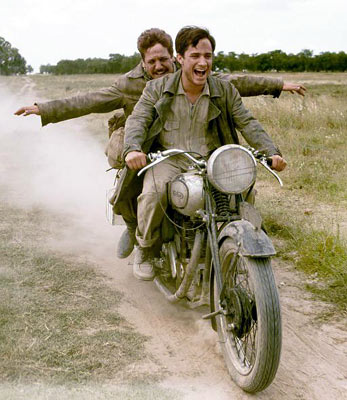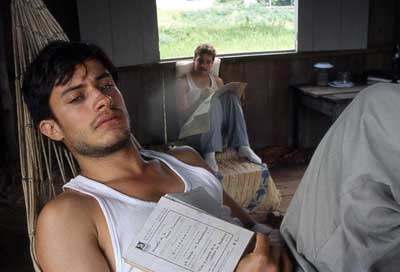

At first glance, The Motorcycle Diaries is the typical coming-of-age film where two guys take a road trip and learn some deep lesson about life. This is a very superficial way of looking at the film. Yes, all of this happens, but it is done in such a way that the viewer can see the transformation of the two main characters on screen. They truly grow from boys to men as they make their way across South America. It helps that one of the guys happened to later become some guy named Che Guevara. The Motorcycle Diaries serves as a good look into the formative years of Guevara, who is an icon today. The really ironic (amusing) element about all of this is that most of the people who idolize Guevara know little about who he is or what he actually did, aside from the fact that he fought to liberate Cuba from Batista, and was really heroic.
The Motorcycle Diaries is based on the journals of Guevara (then Ernesto Guevara de la Serna) and Alberto Granado, two friends who decided to cycle 8,000 miles across South America, beginning in their home country of Argentina, then going through Chile, Peru, Columbia, and Venezuela. On the way, the two, Guevara (Gael Garcia Bernal, El Crimen del Padre Amaro, Y Tu Mama Tambien) and Granado (Rodrigo de la Serna, Gallito Ciego, Nuts for Love), a future doctor and a biochemist, will stop by a leper colony to do some volunteer work. These are two young guys who's main goal is seems to be to hook up with girls in each country. They begin the journey on a high note, riding on Granado's shoddy motorcycle.
It is very cliché to say that the further they went, the more they changed, but this is exactly what happened. Director Walter Salles (Behind the Sun, Central Station) and screenwriter Jose Rivera keep the focus on the duo as they travel through the countries. Their first goal is fun, with Granado constantly trying to pick up on local women. As the two travel further from Argentina, they come in contact with more of the indigenous people. All of these people are poor, and frequently oppressed by others. Seeing this is eye opening for Guevara. He comes from a comfortable background, and being confronted with this shocks him to his very core. As he passes through the various countries, he sees that this problem is the same everywhere. While Granado's objectives remain lightweight and superficial, Guevara begins to think about these deeper issues.
Things really change when they reach the leper colony. The sick are kept across the river, while the nuns and staff stay on the other side. When interacting with the lepers, all staff are to wear gloves, although there is little chance of infection. Guevara sees this as disgusting and dehumanizing, and feels that he is somebody that can make a difference and so something about this. It is this slow realization that is at the heart of The Motorcycle Diaries, and Salles captures it effectively. It is even harder given that this revelation is internal. To achieve this, Salles uses the contrast in personality between his two leads, and the viewer can watch as the movie progresses and the divide widens. The film starts on a light note, with the two friends having fun on their bike ride. The plight and abject poverty of those around him affects Granado, but not as much as it does Guevara. Guevara becomes less playful, and more thoughtful and serious.
Bernal is amazing as Guevara. This is essentially the fourth time American audiences have seen him, and it is his most fully realized character yet. The script requires a lot on his part, and he needs to do a lot of internalized acting, relying less on actions and more on moods. The Motorcycle Diaries requires Bernal to give a low-key, nuanced performance as Guevara, and he succeeds. Salles and Rivera sketch out a fairly complete portrait of a young man, and watching him slowly change is probably the best element about the film. It gets especially touching as he ministers to his patients in the leper colony. He sees how the people he met along the way were treated like outcasts. Here are true societal outcasts, and Guevara does the best he can to make them feel loved and like they belong.